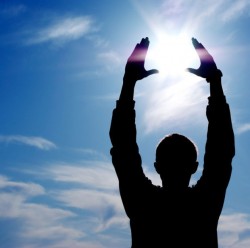What is a Higher Power and Why is it Important to the Recovery Process?
Having a higher power is a very important concept during the recovery process. Some may choose a more religious definition while others will need something to help them through the difficult process. There are many different ways higher power can be important to the recovery process.
God as a Higher Power
There has never been a set definition of a higher power, but one of the most popular definition is of a deity, usually God. Some even believe that the term is already predetermined and they will be forced to accept it in order to be successful in their recovery.
Those who practice a religion find God to be an easier way of giving up control and the burden of their future in hopes that it will work out the way it was meant to. This can be helpful in the acceptance of the process of recovery because the addict can believe that they are being led to the life they truly desire.

The universe is a common higher power for those who don’t believe in God.
According to the USDVA, spirituality can produce positive outcomes to help a trauma like that of an addiction, which can make it easier to accept the beliefs of the 12-step program. It can be important to pray whenever the individual has an opportunity.
Even if he or she is back and forth in their beliefs, it allows him or her to connect with the universe and engage with a higher power that is bigger than they are.
Atheists & Higher Power
For those who do not practice religion, finding something bigger than themselves is not quite so simple. The best way for those without belief to find a higher power is to believe that the group that take part in has a power beyond themselves that can help them to achieve their goals.
This use of higher power in this case is a powerful motivator to continue the fight to sobriety.
Options for Atheists
It is a little easier for an addict who is religious to put their faith in a higher power, such as God. However, for atheists, this may not be so simple. Finding something to relate to or to guide them along is not a lost cause.
Being open minded can open many doors for finding something that is bigger than the addicts are. It is okay not to agree with everyone’s opinions, but while they are discussing what they are doing to cope with their newly reformed lives, it may give the addict a new perspective or option for a higher power.
He or she may be surprised at how much they have in common with others who are going through similar situations.
Meditation is highly recommended for those going through the recovery process. In order to maintain a clear mind, it is important to know how to quiet them and find peace in life. For just a few moments, it is important to sit still and listen to the quiet to reach a higher level of self-discovery.
For some, music can be a big help in the fight toward recovery. Music resonates the personality and can give the addict something to relate to, which can help them through the process of recovery. Along with this, many studies have shown that playing musical instruments, especially drums, may help an individual to access a higher power to help them through the struggle.
According to a study conducted by the NCBI, drumming can enhance relaxation, theta-wave production, and brave-wave synchronization, which can alleviate selfishness, isolation, and alienation by helping them to connect with their atmosphere.
Drumming creates a pleasurable experience and release emotional trauma, which can help them to accept their new lifestyle. It was concluded that drumming circles are complementary for addiction therapy and can help stop relapse from occurring.
A higher power is the motivation that helps an addict to recover from their addiction. For religious addicts, it is very beneficial to pray and to believe in a God who can help lead them where they need to go. For atheists, there are many options, which can include believing in the power of the group, or drumming to release their emotional trauma.
If you or a loved one is suffering from an addiction of any kind and needs help, call 800-781-0748 (Who Answers?) to speak with a caring specialist that can assist you.